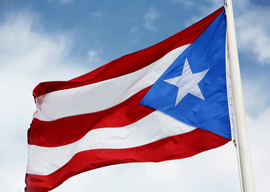
October 04, 2017

Source: Bigstock
The U.S. invested heavily in Puerto Rico, using tax breaks to encourage manufacturing companies to relocate there, especially after Cuba aligned with the Soviet Union. In 1976, when Cuba was sending expeditionary forces to fight for communism in Africa, Congress granted a massive corporate-income-tax loophole to American firms with high intellectual-property costs, such as pharmaceutical companies, that established plants in Puerto Rico.
In 1996, however, with the Cold War won, Congress voted to turn off this expensive tax subsidy as of 2006. Surely, after 108 years of American stewardship, Puerto Ricans would be ready to stand on their own two feet.
Nope. Puerto Rico immediately plunged into an endless recession. (The Puerto Rican downturn was also related to the housing collapse that hit Hispanic-heavy Sand States in the U.S. a couple of years later.)
Migration out of Puerto Rico has accelerated. The population of Puerto Rico has dropped by about one-eighth since the end of the big tax loophole.
Puerto Rico provides a useful test case of open-borders ideology, because about three-fifths of all Puerto Ricans on earth now live in the fifty states. The Puerto Rican example suggests that Third Worlders would stop coming to America only after our standard of living descends to Third World levels.
Recently, Puerto Ricans have primarily been migrating to cheaper Orlando in central Florida. Hillary’s campaign devoted considerable effort to registering Puerto Rican new arrivals to tip the crucial purple state of Florida blue.
That strategy failed to swing Florida in 2016. But Democratic strategists are hoping that an exodus exacerbated by Hurricane Maria will deliver Florida’s 29 electoral votes in 2020.
This kind of election rigging helps explain why Democrats have been so compliant in letting Puerto Rico fall apart.
That the empire abroad can be used to tip elections at home would hardly have been surprising to ancient Romans. Eugene McCarthy, the independent-minded Democratic senator, pointed out in 1992 that globalism was making America “a colony of the world.” But this is not the kind of concept that modern Americans are supposed to think about.
Theoretically, American imperial administrators could do much to reform Puerto Rico’s incompetence and venality in the 21st century, just as the vigorous military doctors William Gorgas and Leonard Wood drained the yellow-fever swamps of Cuba and Panama in the early 20th century.
But under our system of politically correct imperialism it would be discriminatory for Americans to notice that Puerto Rico is crooked and inept. So it’s unlikely that we will either reorganize or liberate our useless colony.